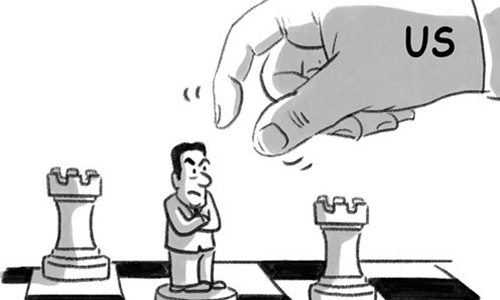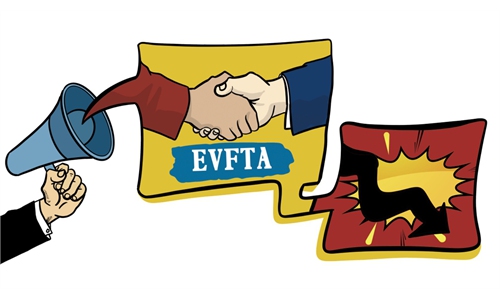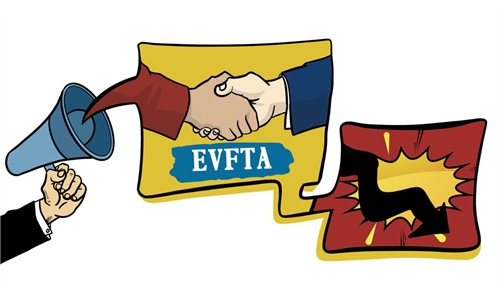
Illustration: Liu Rui/GT
July 11 marked the 25th anniversary of the normalization of diplomatic relations between the US and Vietnam. General Secretary of the Communist Party of Vietnam Central Committee and President Nguyen Phu Trong exchanged congratulatory letters with US President Donald Trump. Trump wrote that the advancement of the bilateral ties is a special miracle. US Secretary of State Mike Pompeo also released a statement. US Assistant Secretary of State David Stilwell on July 10 chaired the 25th anniversary ceremony event.
In January, US Ambassador to Vietnam Daniel Kritenbrink celebrated a Vietnamese traditional holiday. Since then, the celebratory activities of the 25th anniversary of US-Vietnam normalization of diplomatic relations had already warmed up. It seems that the two countries' relations were not affected by the COVID-19 pandemic. In March, the aircraft carrier USS Theodore Roosevelt arrived in Vietnam, and the US provided Vietnam with nearly $3 million in health assistance during the COVID-19 fight. The US has also hyped up China's "ramming and sinking" of a Vietnamese fishing boat in April. In May, Nguyen Phu Trong and Trump held a phone call.
In fact, China would like to see well-developed Vietnam-US relations. As China's important neighbor, Vietnam's development will benefit the overall prosperity and stability of China's periphery. However, the US has forcibly interfered in the affairs of the Southeast Asian countries, including Vietnam. This is neither peaceful development nor reciprocal treatment. Vietnam must have been familiar with the US' tricks.
The US' policies toward Southeast Asia have been inconsistent, completely driven by the US' interests. Washington does not care about morality and justice at all. When Trump took office, he did not pay much attention to Southeast Asia. Vietnam has long been a country the US wants to take advantage of to geopolitically contain China. However, once Vietnam and the US have conflicts, the US will not hesitate to wave its stick at it. Vietnam has been threatened by the US' trade sanctions for many times.
In the domain of politics, there is no fundamental conflict between China and Vietnam apart from the South China Sea issue. Beijing and Hanoi have similar political systems. They have common interests in safeguarding their social systems and the leading role of their respective parties. This can be exemplified by Vietnam's firm support for the national security law for Hong Kong.
On the other hand, Washington has never given up its attempts to promote the "color revolutions" in Hanoi. Taking advantage of various social issues such as democracy and human rights, the US has vigorously stirred up frictions within Vietnam. Hanoi has remained soberly aware and vigilant in this regard.
Cooperation in trade and investment between Vietnam and the US has been an important driving force for the advancement of their bilateral ties over the past 25 years. Bilateral trade has increased over 170 times from $450 million in 1995 to $77.6 billion in 2019. The US has listed Vietnam as a preferred partner in US supply chain.
However, in terms of supply chain, it remains difficult for Vietnam to get rid of its structural dependence on China. In the initial stage of the COVID-19 outbreak, borders between China and Vietnam were temporarily closed. To reduce the impact on its exports to China, Vietnam took the initiative to ask China to resume border trade.
In the first half of 2020, the total import and export volume between China and Vietnam rose 18.1 percent, first among the Association of Southeast Asian Nations.
In the domain of diplomacy and security, Vietnam claims it pursues a foreign policy of independence, self-reliance, openness, diversity and multilateral external relations. This country hopes to upgrade its international status by adopting strategies of balance between great powers.
As a matter of fact, Hanoi hopes to rope in Washington to enhance its strategic strength in the South China Sea. This is a strategic choice Vietnam made according to its national power and regional situation.
But if the US' involvement in the South China Sea escalates regional tensions or breaks the balance between China, Vietnam and the US, then the development of Vietnam will be disrupted. Vietnam's losses will outweigh its gains.
The author is an assistant research fellow of the Institute of South and Southeast Asian and Oceania Studies at the China Institutes of Contemporary International Relations. opinion@globaltimes.com.cn



